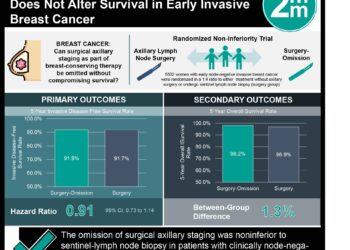2 Minute Medicine Rewind June 11, 2018
Patients presenting with a difficult airway in the emergency department are typically intubated with an endotracheal tube and stylet. If the provider deems it a difficult airway or fails to intubate, a bougie can also be used to help secure the patient’s airway. In this randomized clinical trial, 757 emergency department patients were randomized to undergo initial intubation facilitated by bougie (n = 381) or endotracheal tube with stylet (n = 376) to compare first intubation success. The primary outcome was first-attempt intubation success in patients with at least 1 difficult airway characteristic (body fluids obscuring the laryngeal view, airway obstruction or edema, obesity, short neck, small mandible, large tongue, facial trauma, or the need for cervical spine immobilization). Researchers found that in patients with at least 1 difficult airway characteristic, first-attempt intubation success was higher in the bougie group (96%) than in the endotracheal tube plus the stylet group (82%) with an absolute between group difference of 14% (95% Cl 8% to 20%, p<0.05). Among all patients, first-attempt intubation success in the bougie group was higher than the endotracheal tube plus stylet group with an absolute difference of 11% (95% Cl 7% to 14%, p<0.05). The incidence of hypoxemia did not differ significantly between groups. Researchers therefore concluded that the use of a bougie compared with an endotracheal tube plus stylet results in higher first attempt intubation success in the setting of the emergency department.
A Placebo-Controlled Trial of Bezafibrate in Primary Biliary Cholangitis
Patients with primary biliary cholangitis (PBC) are usually treated with ursodeoxycholic acid. In the event of treatment failure or lack of intervention, progressive liver disease results. However, some data has indicated that fibrates, which are agonists of peroxisome proliferator activated receptors (PPARs), in combination with ursodeoxycholic acid, may have potential benefit in patients who have failed treatment with ursodeoxycholic acid. In this double-blinded randomized placebo controlled trial, 100 patients who had an inadequate response to ursodeoxycholic acid were randomized to receive bezafibrate at a daily dose of 400 mg or placebo in addition to continued treatment with ursodeoxycholic acid to assess the efficacy, safety, and adverse event profile of bezafibrate in this patient population. The primary outcome was a complete biochemical response, defined as normal levels of total bilirubin, alkaline phosphatase, aminotransferases, and albumin, as well as a normal prothrombin index (a derived measure of prothrombin time), at 24 months. Researchers found that patients who received the fibrate had a higher complete biochemical response than those in the placebo group with a difference of 31% (95% Cl 10% to 50%, p<0.001). In terms of complications, two patients in each group experienced complications related to end-stage liver disease. This study therefore shows that for patients with PBC who have failed to respond to ursodeoxycholic acid alone, treatment with a fibrate such as bezafibrate in addition to ursodeoxycholic acid may result in a higher rate of complete biochemical response compared to ursodeoxycholic acid therapy alone.
Gastric cancer is the third most common cause of cancer mortality worldwide and is the fifth most common cancer. It is usually treated with chemotherapy, with a platinum-based and fluoropyrimidine regimen for patients with advanced or metastatic cancer. As a second-line treatment, cytotoxic chemotherapies are commonly used, including paclitaxel. Pembrolizumab is a humanized, high-affinity, IgG4-k monoclonal antibody that binds to the programmed death 1 (PD-1) receptor, and has shown promise in the treatment of recurrent or advanced gastric cancers with a programmed cell death ligand 1 (PD-L1) combined positive score (CPS) of 1 or higher. In this randomized controlled trial, 592 patients were randomized to receive either pembrolizumab 200 mg every 3 weeks for up to 2 years or standard-dose of paclitaxel to compare overall survival in patients with advanced or metastatic gastric or gastrooesophageal junction adenocarcinoma. Researchers found that there were 395 patients who had a PD-L1 CPS of 1 or higher, of which 196 patients were assigned to receive pembrolizumab and 199 patients were assigned to receive paclitaxel. The significance threshold for overall survival was established at p=0.0135 (one-sided). The pembrolizumab group did not demonstrate significantly prolonged overall survival with a hazards ratio of 0.82 (95% Cl 0.66 to 1.03, one sided p=0.0421). Overall, participants in the pembrolizumab had fewer grade 3-5 treatment-related adverse events at 14%, compared to 35% of patients treated with paclitaxel. Overall, the results of this study show that pembrolizumab does not significantly improve overall survival compared to paclitaxel as a second-line therapy for patients with gastric cancer.
Psoriatic arthritis can manifest in various ways, such as dactylitis, enthesitis, and sacroiliitis, all arising from a systemic, chronic, and inflammatory disease. At this time, there are numerous biologics and other drugs used as part of the management of this disease. However, there is still an unmet need for single drug therapies with robust efficacy and acceptable safety profiles. In this randomized controlled trial, guselkumab, a human monoclonal antibody that binds to the p19 subunit of interleukin 23, was assessed for its efficacy and safety in patients with active moderate to severe psoriasis. Participants were age 18 years or older with active psoriatic arthritis and plaque psoriasis affecting at least 3% of their body surface area who had an inadequate response or intolerance to standard treatments. Patients were randomly assigned 2:1 to receive subcutaneous guselkumab 100 mg or placebo at week 0, week 4, and every 8 weeks thereafter for 24 weeks. The primary endpoint was the proportion of patients with at least 20% improvement at week 24 in signs and symptoms of psoriatic arthritis according to American College of Rheumatology criteria (ACR20) in the modified intention-to-treat population. Researchers found that approximately 58% of patients in the guselkumab group and 18% of patients in the placebo group achieved an ACR20 response at week 24 (difference 39.7%, 95% CI 25.3% to 54.1%, p<0.0001). There was no significant difference in the incidence of complications or adverse events between the two groups. This study therefore shows that guselkumab may significantly improve signs and symptoms of active psoriatic arthritis with an acceptable safety profile.
Some young adults can experience hip pain due to femoroacetabular impingement syndrome, the result of premature contact between the femur and acetabulum during hip movements. Current guidelines state that arthroscopic hip surgery and physiotherapy-led conservative care can effectively treat this disease, however, the current literature does not clearly indicate which intervention is superior. In this multicenter randomized controlled trial, 348 patients age 16 years or older old with femoroacetabular impingement syndrome were randomized to receive hip arthroscopy or personalized physiotherapy-led hip therapy. Patients and treating clinicians were not masked to treatment allocation, but researchers who collected the outcome assessments and analyzed the results were masked. The primary outcome was hip-related quality of life, as measured by the patient-reported International Hip Outcome Tool (iHOT-33) 12 months after randomization. Researchers found that the mean iHOT-33 scores improved from 39.2 to 58.8 for patients in the hip arthroscopy group, while a mean improvement from 35.6 to 49.7 was seen in patients that received personalized hip therapy. At 12 months after randomization, the mean difference in iHOT-33 scores was 6.8 (95% CI 1.7 to 12.0, p<0.05) in favor of hip arthroscopy. Approximately 72% of patients in the hip arthroscopy group reported adverse events while only 60% in the personalized hip therapy group reported adverse events. This study therefore shows that, while both interventions improve quality of life for patients with femoroacetabular impingement syndrome, hip arthroscopy results in a greater improvement than the personalized hip therapy.
Image: PD
©2018 2 Minute Medicine, Inc. All rights reserved. No works may be reproduced without expressed written consent from 2 Minute Medicine, Inc. Inquire about licensing here. No article should be construed as medical advice and is not intended as such by the authors or by 2 Minute Medicine, Inc.







